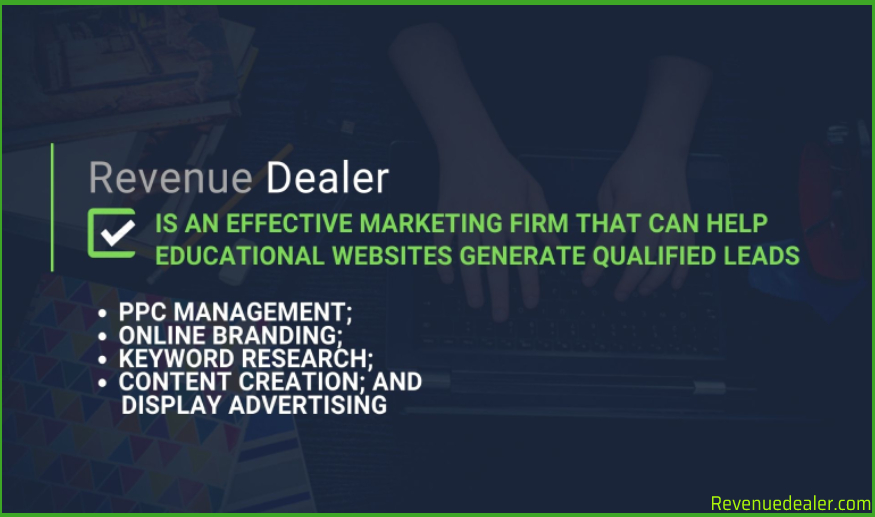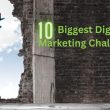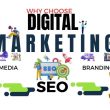In this article, Revenue dealer not only guides you about effective student lead generation ideas for Colleges and universities. But, we can also provide you with qualified leads to gain more student leads and earn more revenue with us.
The goal of any higher educational website, including a College or university, is to attract more students. If a College or university can attract more students, it will sell more degree programs and increase its revenue.
The small- and medium-sized business (SMB) space is an ever-changing landscape. The competition to get ahead of the pack is getting more challenging every day. If you don’t have a clear strategy, you can easily fall behind your competitors.
Lead generation is essential: it helps you establish a pipeline that leads to sales by attracting new students and nurturing them through the buying process.
The Importance of student Lead Generation for Colleges and Universities

We all know that Lead generation is vital when trying to attract new students and increase enrollment.
The Lead Generation Is The Process Of Creating Interest In Your Institution Among Potential Students
Lead generation is an essential part of the marketing process, and it’s also the first step in the sales funnel, which you can use to track and analyze how people interact with your content over time.
Student Lead generation helps you understand what topics or products are attractive to your audience so that you can focus on those areas for future campaigns.
For example, offer online classes about financial literacy. You might see some initial interest from students who want help with their credit scores but don’t have much capital to invest.
They’re unlikely to become full-time attendees at one of your brick-and-mortar campuses. Using these insights will help inform how much time and money should be invested into various lead-generating channels like social media ads or digital PR efforts rather than wasting resources on strategies that won’t produce results.
A Good Lead Generation Strategy Helps The Potential Students Find You
You should have a consistent and effective lead generation strategy to help you find your target audience. You’ll be able to reach out to potential students through email, phone calls, or social media.
Here are some ways that you can use each channel:
- Email marketing: Send out a newsletter about your courses and programs. Include links where they can apply for admissions and scholarships if needed.
- Social media: Promote your institution through paid ads on Facebook or Instagram (or both). Share interesting stories about life at college in general and encourage people who might be interested in attending one day themselves!
- Phone calls/emails: Reach out precisely when it’s time for enrollment season—this is when most students decide which college they will attend next year if they haven’t already picked one yet! A good strategy here would be sending out an email blast first reminding them about all the reasons why coming back home wasn’t so bad after all 😉
It Makes Your Brand Visible And Familiar To Prospective Students
Lead generation is essential for higher education sites because it makes your brand visible and familiar to prospective students. Once you have attracted a specific audience with relevant web pages, you want them to interact with your site as much as possible. This will help you reach out to prospective students interested in your services or products.
Lead generation is the best way for higher education institutions to reach out and connect with their target audience.
Student Lead Generation Ideas For Colleges And Universities

Create guides
Students are looking for help with the most common issues they face as students. A good guide can provide the answers they’re looking for and even cover topics you didn’t think of yourself! Here are a few examples of popular guides we’ve seen:
- How to find a job while in college (and how to build your resume)
- How to create a budget that works on campus
- Create events:
Events are another great way to increase engagement with your site’s users and convert them into leads! You could organize an event around a holiday or host regular meetups where students can bring their laptops and work together on projects or assignments. Examples include:
Holiday parties like Thanksgiving or Christmas Eve. These events typically take place during colleges and universities breaks when most people have time off from classes – perfect timing for generating leads.
Host a Webinar
Hosting a webinar provides an opportunity to generate leads and increase brand awareness. Here are some steps you can take to maximize the success of your webinar:
- Start with research. Before you create or attend any event or campaign, you must know how many people are on each platform and what types of content they like best. This will help shape your messaging for the audience and ensure attendees have a positive experience.
- Create an agenda and script (if applicable). If you’re leading a live webinar, you’ll need to prepare in advance by creating a detailed plan for attendees and delivering an informative script during the actual event. Make sure everything is recorded so participants can reference it later if needed!
- Promote offline events before they happen – this is especially true if participants don’t know each other personally beforehand (and thus cannot rely on social media alone). Consider sending out invitations via email or snail mail two weeks prior; some companies prefer mailing reminders closer than this amount, though, depending upon their target audience demographics/preferences when it comes down right now before getting ready ourselves picking up where we left off last week (minus one person who was away).
Run a Free Course
If you have a free course relevant to your audience, this is an excellent way to attract new students. The course should be highly qualified and include significant content to help achieve the business’s objective.
Make Interactive Content
Interactive content is a great way to engage with your audience. You can create interactive content in any format and style, but some examples include quizzes, polls, and surveys. Interactive content can be used anywhere on your site—in blog posts like this one or footer links—but we recommend using it at the top of articles to encourage readership.
You can make interactive content using tools like Google Forms or SurveyMonkey (or even by hand) and then embed it in your page using HTML code or with add-ons like Wufoo for WordPress.
Once you’ve created your questionnaires and data sets as PDFs or spreadsheets for publication online, you’re ready to publish them.
Just remember: always make sure that the questions being asked to relate directly back to what was written earlier within that same piece of writing, so nobody gets confused later on down the line when they see results from their answers coming up later on down.
Send Emails
You can use email marketing to generate student leads. It’s a great way to keep in touch with your audience and get feedback.
You would send emails out regularly, once or twice a week, with content that relates closely to what they’re interested in. For example, suppose you’re an online degree site for students who want to learn more about marketing.
In that case, you could create an email newsletter containing articles on top marketing trends and tips on how students can use social media effectively to market their business ideas.
Suppose you have an online college that offers courses related to coding programming languages such as Java or Python (or any other language). In that case, you might send weekly newsletters containing links explaining how these languages work and what they’re used for.
As well as some code snippets written by experienced programmers for beginners (like yourself) who want something easy-to-follow but still challenging enough so it’ll keep their minds engaged while learning this new skill set.
Have Dedicated Landing Pages
Landing pages are single-use web pages created for the sole purpose of capturing leads.
Colleges and universities can use them to create targeted campaigns and increase their conversion rate. Landing pages are typically optimized to provide users with the necessary information, but they also include extra calls to action to drive traffic to the sales funnel.
A good landing page should:
- Include an eye-catching headline that will capture the visitor’s attention right away (e.g., “Get your student loan today”)
- Create urgency by giving visitors a limited timeframe in which they can take advantage of your offer (e.g., “Offer valid until January 30th only”)
- Provide easy ways for users to sign up or subscribe so you’ll have more opportunities later on down the line once you’ve generated leads from them via email marketing campaigns or other channels like social media advertising
Use Your Alumni Network To Your Advantage
The most potent way of generating student leads is by leveraging your alumni network. This can be done in several ways:
- Use your alumni to spread the word about what you do and how your business can help them, for example, with introductions or referrals.
- Use your alumni to promote products and services that would be useful for them, such as webinars on how businesses can use social media effectively.
- Use your alumni to find new customers through their networks. In this case, you should give them an incentive (e.g., a discount) in return for introducing attractive prospects and helping you qualify leads they introduce so they’re more likely to convert into paying customers later down the line when they’ve had a chance to try out and see if what you have offered meets their needs as promised before deciding whether or not they’d like us enough to buy something from us again later on down the road when we come back around looking for funds again sometime next year hopefully soon after Christmas holidays end once everyone gets over being sick but not too sick so that no one gets sick).
Attract Your Target Audience With Ads
One of the best lead generation ideas for College and university websites is to create ads to attract your target audience.
Targeting your ads will help you get more sales and generate leads.
You can use Facebook and Instagram ads to drive people back to your landing page or website.
Read our more blogs related to lead generation:
How To Get More Home Service Leads – Pro Tips
15 Successful Strategies To Generate Insurance Leads
15 Effective Ways Of Commercial Real Estate Lead Generation
5 Challenges of Student Lead Generation That Colleges and Universities Face

If you’ve tried to market anything on a college or university website, you know it’s not easy. And if you haven’t tried it yet, then we can tell you that it’s not easy—which means there’s still time for you to get into the game before everyone else does. That said, here are five challenges we’ve found when trying to generate leads online at these sites:
Challenge 1: The Audience Is Elusive.
The audience is the first challenge of lead generation for college and university sites. College students are hard to reach on the phone, in person, and via email. They’re difficult to reach via social media as well.
That’s why search is vital for lead generation for colleges and universities: it’s a great way to get in front of potential students with relevant ads that capture their attention, which means more leads!
Search ads offer an advantage over other types of paid advertising because they can be highly targeted based on keywords related to your product or service. This makes them ideally suited for lead generation, as you can target qualified prospects by location and match other criteria like age or gender if desired.
Challenge 2: Competitors Are Everywhere.
The second challenge is that your competitors are not just colleges and universities but also other schools, online programs, and other educational resources. So you have to be able to stand out from the crowd. You have to be able to differentiate yourself from your competitors.
You may need to add more value than you’re used to providing for potential students and their families to choose you over a competitor. For example, suppose one of your competitors has an excellent reputation in a particular field or area of study. In that case, you might consider adding similar features to your lead generation strategy (e.g., internships).
Challenge 3: Fewer People Are Coming Into Campus For Enrollment.
One of the biggest challenges that Colleges and universities face is that fewer people are coming to campus for enrollment.
According to statistics, there has been a decline of about 6% in the number of prospective students who enroll in these institutions. This is due to an increase in online learning, which allows students to complete their entire coursework without ever stepping foot on campus.
This has resulted in a decrease in the number of visitors and prospective students visiting these institutions.
Challenge 4: Social Media And Blogs Are Distracting For Users.
When you think of a student, what do you see? If your mental image is anything like mine, it’s someone sitting in a library or coffee shop with their laptop open, reading articles and papers. The reality is that most students today spend less time studying than they did even ten years ago—and much more time on social media!
According to recent research by the creators of RescueTime, college students spend an average of 28 hours per week on social media sites like Facebook and Twitter; for college graduates who are now young professionals (a group we’ll call “young pros”), the number jumps to 42 hours per week.
That’s an astonishing amount of time spent online when you consider how many hours are devoted to classes and studying each week at most colleges and universities—and this doesn’t include other distractions such as video games or YouTube videos.
Challenge 5: Marketing Isn’t A Priority For Top Decision Makers At Colleges And Universities.
The fifth and final challenge of lead generation for college sites is that marketing is not a priority.
Marketing is not a priority because it’s not a core competency.
Core competencies are things your company can do better than anyone else, or at least as well as anyone else. For example, suppose your company was in the construction business. In that case, you might say that you have excellent management skills, or if your company was an engineering firm specializing in building bridges, then perhaps you could say that you have outstanding engineering talent or strong project management capabilities.
However, when it comes to generating leads through content marketing programs like SEO and social media advertising (Facebook Ads), most universities are at least two steps behind their competitors: they aren’t doing it very well.
The result? Marketing isn’t significant enough to be considered essential by top decision-makers at colleges and universities; therefore, these businesses don’t invest much time or money into improving their ability to generate leads through content marketing programs such as SEO/SEM or Facebook Ads campaigns.*
How Revenue Dealer Helps You To Generate Qualified Leads For Your Higher Education Institutions

Revenue Dealer is an effective marketing firm that can help educational websites generate qualified leads. Revenue Dealer targets college students, parents, and teachers. It uses a combination of customized content, targeted ads, and search engine optimization to reach its target audience. The firm helps its clients optimize their websites for higher rankings and better traffic.
Targeting The Niche
First of all, you need to target the niche. Niche is the core of your business, a group of people with a common interest, problem, or need.
For example, if you target students looking for higher education colleges, your niche would be “students.” If you are targeting teachers who want to upgrade their skill sets, your niche will be “teachers.”
Fixing a Call To Action
A call to action is a phrase that encourages users to take action. For example, “Learn more,” “Take a tour,” or “Sign up now.” Common types of calls to action include:
- Informational – A statement that gives the user important information about something. For example, “Join us for our annual conference” or “Stay up-to-date with the latest trends in higher education.”
- Action-oriented – A statement telling the user what you want them to do next. For example, “Download our brochure today” or “Get a free quote for seven days only!”
- Benefit-oriented – A statement explaining how using your product will benefit your customers/clients (e.g., save time, increase revenue).
Making Use Of Effective Marketing Techniques
Different marketing channels are the most effective ways to generate qualified leads for your higher education site. The following are some of the marketing channels that can help you maximize your ROI and bring high-quality traffic to your site:
- Search Engine Optimization, or SEO, it’s one of the best ways to drive relevant traffic to your website.
- In social media marketing (SMM), with this technique, you can reach out to a mass audience through multiple social media platforms. You can use SMM as a branding tool, grow brand awareness and efficiently promote products or services.
Keeping An Eye On The Analytics
Analytics are essential to measuring the effectiveness of your campaign. They provide insight into how users interact with your website and help you understand what is working and what isn’t.
They also help you make better decisions regarding optimizing your digital campaigns for mobile devices or improving engagement with Facebook ads by targeting people who are more likely to convert to a landing page, for example.
There are many different types of analytics platforms out there that can give you valuable information about how visitors interact with their site. Still, we’ve found Google Analytics (GA) to be an effective tool that has the power to help us make informed decisions about how best to use our resources to produce results for our client’s businesses.
Revenue Dealer Is An Effective Marketing Firm That Can Help Educational Websites Generate Qualified Leads.

Revenue Dealer is not just another marketing firm; it is a marketing firm that helps higher education institutions to generate qualified leads. The concept of Revenue Dealer was developed by the Founder and CEO, who realized the need to help educational websites generate qualified leads to increase their revenue.
Revenue Dealer uses marketing techniques such as pay-per-click ads, search engine optimization (SEO), content creation, email marketing, and display advertisements to help educational websites generate qualified leads. The services offered by Revenue Dealer include:
- PPC management;
- Online Branding;
- Keyword Research;
- Content Creation; and
- Display Advertising
Conclusion
The revenue dealer is a marketing firm that can help you generate qualified leads for your higher education institutions. It’s essential to focus on the niche, fix call-to-action buttons and use effective marketing techniques such as email campaigns and social media ads. It would be best to monitor your analytics to see how much traffic is coming from these sources to adjust accordingly.
Also, in this blog, we have guided you about student lead generation ideas for colleges and universities. Still, if you find any issues or have any queries, feel free to contact our lead generation experts. Who can easily take your business to the point you always want to.









